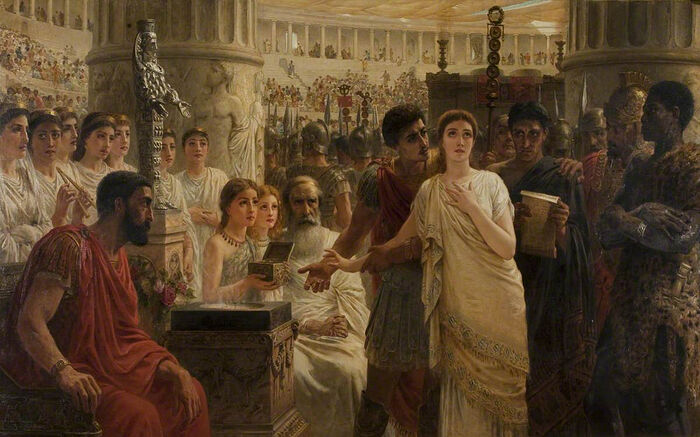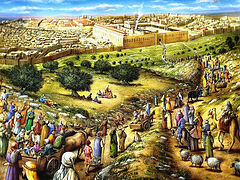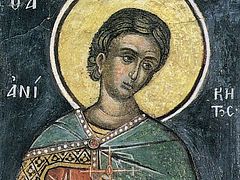 Edwin Long, Diana or Christ?, 1881, oil on canvas.
Edwin Long, Diana or Christ?, 1881, oil on canvas.
Let’s face the task of putting ourselves in the place of a pagan of the Roman Empire. Let’s “try on his dress”. How would he react to the preaching of the Jewish fishermen? Let’s listen with his ears and think with his mind. Perhaps then it will be possible to understand more clearly how Christianity entered the Roman world, how it penetrated into homes and into hearts.
Ancient culture was focused on searching for meaning: philosophy with its inexhaustible existential questions, sculpture with its proportions and search for the perfect beauty, work on the political structure as a search for a form to embody the ideals of society. All this inspired people to look for a standard and an idyll.
The Birth of Christ on the outskirts of civilization
A magnificent emperor ruled in the majestic Palatine Palace, which opened when the King of Kings and the Lord of all Living Things came into the world in a squalid cave in little known Bethlehem on the outskirts of a huge empire.
Delving into the religious history of Rome during the time of Christ and the Apostles, we can find amazing meanings, with which the heads of the Romans were “seasoned”. It is impossible to disregard them, and we also cannot help but marvel at the greatness of Divine Providence, which was preparing people’s hearts to accept the Good Tidings of the Salvation of the world and man.
Christ was born in the multinational Roman Empire, which included both the East and the West, absorbed the great cultures of antiquity, their customs and religions. Christ was recorded on the census as a citizen of such an empire in order to attract from the east and from the west… to the Kingdom of God (cf. Lk. 13:29).
Caesar and the God-Man Christ
The Roman Empire was founded almost on the eve of the Birth of the Lord under Emperor Octavian Augustus (the 30s BC—14 AD). Studying the life and activity of the emperor, in whose days the Savior was born, we admire the greatness of Divine Providence. By the earthly order of things, the minds and the hearts of the citizens of the Roman world were being prepared to accept the Heavenly Fatherland.
We will single out several facts from the life of the pagan emperor, which can be considered symbolic and even to some extent “prototypal”. They prepared the pagan hearts to receive the message of the Savior and salvation.
1. We know about St. Isaiah’s prophecy that Christ would bring peace: And they shall beat their swords into plowshares, and their spears into pruninghooks (Is. 2:4). The prophets themselves, centuries before Christ, said of the Messiah, This man shall be the peace (Mic. 5:5). In Rome just before Christ’s Birth and in the early years of Jesus’ life, the idea of ending wars and establishing peace (pax Augusta) were widespread. Thus, in 13 BC, the “Altar of Peace” was set up in Rome. In “The Acts of the Divine Augustus” the Emperor emphasized that during his reign the gates of the temple of the god Janus were closed three times, which meant the end of all wars and was a symbol of peace. Christ, Who brought true peace, deigned to come to earth in the days of the cessation of wars.
2. Christ is the Son of God, God Who came into the world, clothed in our nature and making us His kin. All nations and kingdoms must offer their glory to Him. He brought everyone together before Him: At the name of Jesus every knee should bow, of things in heaven, and things in earth, and things under the earth (Phil. 2:10). He, the true Son of God, was born under the emperor who called himself the “son of god.” This is what Octavian, Julius Caesar’s adopted son, called himself. In the time of Octavian, the cult of imperial liturgies appeared (“liturgy” means “work of the people” in Greek, because they were performed at the expense of the empire’s population). January 1, 42 BC, the senators proclaimed Caesar god, and Octavian became known as the “son of god”.
3. In the days when Christ God, Who revealed to us the Name of God the “Father”, was an Infant and made His first steps, Octavian received from the Senate the honorary title of “father of the fatherland” (pater patriae—2 BC). Octavian did not choose Mars, the god of war, as his patron deity, but Apollo, who brings order and arranges human affairs. Christ, Who was born at this time, truly arranged all our affairs for good. He is the only One Whom the Prophet Isaiah called the everlasting Father during the foundation of Rome (Is. 9:6).
4. Pagan emperors and kings of Rome bore the title “Pontifex Maximus”, literally “the great bridge builder”—the one who united the earthly with the Heavenly. In fulfillment of the great Pontifex, the cult charged to avoid not only touching, but even looking at the dead, including one’s relatives, which Octavian observed carefully. Let us recall that in the Old Testament, given 1400 years before the Birth of Christ, the high priest of the true God was forbidden to touch the dead, even his own parents.
In the paganism of Rome and in the Jewish religion there was a foretaste that death had nothing to do with the true High Priest. It was fulfilled in Jesus. Christ is the Conqueror of death: He came to destroy its power and make the way, the bridge from death unto life (Jn. 5:24). Not only did He raise others from the dead, but He even entered death Himself, and death, trampled down, could not bear His burial that lasted three days.
5. Octavian’s adoptive father Julius Caesar became the first “god” proclaimed in Rome. After that he was killed by supporters of the republic. He wore the purple robe of Jupiter of the Capitoline Hill and went down in history. Let’s recall how the soldiers at Pilate’s trial put a purple robe on Christ—the clothes of Caesar and Jupiter. Christ always called Himself the Son of Man, being God from Heaven. He was put to death. But He rose again, having conquered death and hell.
After another victory a statue was erected to Caesar as to the “invincible god” (“pantocrator” in Greek), where he was depicted leaning on a sphere that symbolized peace. Christ, the true “Pantocrator”—the Almighty—enlightened the whole universe, wins all the battles that those who believe in Him wage in His name, and contains the world with His Love.
6. There were oak leaf wreaths in the military halo of glory of Rome—the symbol of Jupiter. A valiant soldier was crowned with it as a reward for saving a fellow soldier on the battlefield. The saved one wove a wreath for him for the great good deed of saving his life. The saved one was supposed to honor his savior as his father. When Emperor Octavian saved the country from civil war, he was regarded as a benefactor. An inscription has survived in Ephesus that calls Octavian “the common savior of all human lives.”
Christ is the Savior from the power of death. He alone is the true Savior of all people’s lives. When the Apostles spoke of salvation, all the Gentiles understood the true meaning of this word: salvation from the power of death, the gift of life.
From the earthly to the Heavenly—from the emperor to Christ
At the turn of the age, Rome was engulfed by a surge of lively religious feeling, and the center of that feeling was the emperor—a living god who brought peace, a good and just winner. It seemed that the whole world was being renewed. At that time, the poet Ovid revived the concept of a Golden Age where people would be faithful to justice without coercion. The emperors who succeeded Octavian Augustus did not come up to the people’s expectations; among them were both worthy men and outright monsters.
Both in Judaism and in the Roman State at the time of the preaching of the Apostles there was a “Great longing” for an earthly kingdom with an earthly living and good god. This idea brought both Jews and Gentiles to Christianity. Let’s recall the great Paul and the great former pagan witnesses—the elite of the Roman State: Great-Martyrs George the Victorious, Demetrius of Thessalonica and Barbara.
Researchers note that the New Testament authors were already using terms from the imperial cult, explaining the relations between man and Christ the Savior. Pagan religious honors rendered to the emperor, and all the hopes pinned on him, became a reflection of the glory of Christ. Through the Roman State on the earthly level the minds were prepared for the Heavenly message. Earthly values carried a deeper meaning and Heavenly hopes.
The desire for purification was the religious motivating force of Rome at the turn of the old and the new eras of mankind, in the years when the Deliverer came, and unto Him shall the gathering of the people be (Gen. 49:10). Christ was killed by the Sadducees because He proclaimed Himself God, but He truly resurrected, and streams of preaching about the great King of Kings flowed into all corners of the empire. These were fervent words supported by deeds, life and miracles. This confirmed the belief that He was indeed the true Son of God, God and the Savior, the Ruler and the Peacemaker. Researchers call the ancient religion the “Old Testament of European Christianity”, and Augustus the “Roman David”—the king and a prototype of the true Messiah.
What the prophets had said was fulfilled. The Almighty came that they might have life, and that they might have it more abundantly (Jn. 10:10). Pagans, disappointed in the subsequent decline of Rome, could not but believe this.



